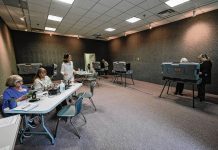Indiana’s 6th District in Congress will have a new representative to the U.S. House, with five Republicans and six Democrats vying to be their party’s nominee.
U.S. Rep. Luke Messer, R-Ind., is running for a seat in the U.S. Senate, meaning the 6th District does not have an incumbent seeking re-election for the first time since 2012.
Six of the candidates on the ballot for the May 8 primary are making their first congressional bids. The field also is represented by every age group from the 30s to 80s, and represents a variety of occupations, including small business owners, attorneys and retirees.
Winners in the May 8 primary will advance to the Nov. 6 general election. The general election winner will step into a job that represents the eastern and southeastern portions of Indiana, pays $174,000 and is tasked with making and passing federal laws.
[sc:text-divider text-divider-title=”Story continues below gallery” ]
The Democrats are George Holland, of Rushville; Jeannine Lee Lake, of Muncie; K. Jasen Lave, of Covington; Jim Pruett, of Greensburg; Lane Siekman, of Rising Sun; and Joshua Williamson.
The Republicans are Mike Campbell, of Cambridge City; Jonathan Lamb, of Yorktown; Stephen MacKenzie, of Fortville; Greg Pence, of Columbus; and Jeff Smith, of Liberty.
Here is where candidates stand on two important topics facing Indiana:
Tariffs
“Indiana is one of the largest manufacturing states in America and our businesses need a level playing field,” said Greg Pence, brother of Vice President Mike Pence, himself a former 6th District office holder.
Greg Pence said there are bad actors on the international trade front and President Donald Trump is taking a strong stance on behalf of American companies to ensure the U.S. gets the best deal possible.
MacKenzie, Smith and Campbell also expressed support for tariffs.
“These are needed to keep our trade deficit in balance,” Campbell said.
MacKenzie said he believes in free-market capitalism and free trade that is fair.
“Since NAFTA (the North American Free Trade Agreement) was passed, trade has been free but not fair. I support President Trump’s tariffs so that we can level the playing field and put America first,” MacKenzie said.
Tariffs have been used in the U.S. since the infancy of the republic, the first enacted to protect fledgling industries and fund the treasury, Smith said.
“Tariffs can and should be used wisely to accomplish the same goals as our Founding Fathers intended,” Smith said.
However, Lamb said he doesn’t support blanket trade tariffs.
“It’s not a stretch to anticipate retaliatory tariffs targeting American agricultural goods and made-in-America products. This tit-for-tat would have devastating effects on family farmers, small business owners and manufacturers,” Lamb said.
Most of the Democrats expressed opposition to tariffs.
“Although these tariffs may not affect the economy in a big way, unrestricted tariffs lead to trade wars, which hurt our own country as much as the country we are trying to punish,” Pruett said. “There are better ways to bring trade to a more equal footing.”
Nobody wins in a trade war, Siekman said.
“The tariffs announced by the president may protect a few select industries, but there may be devastating effects when other countries impose duties and tariffs in response, particularly Indiana agriculture,” Siekman said. “A better approach would be a well defined comprehensive trade policy.”
Tariffs are going to further decrease exports to the U.S. and 6th District farmers, and threaten Hoosier businesses, Lake said.
“Estimates predict a loss of 10 percent of the farms in America if these tariffs are enacted. The same with tariffs on aluminum and steel,” she said.
Businesses buy goods and services at the lowest price so that they can produce at the lowest price, Williamson said.
“We hurt our own businesses when we raise prices through tariffs. Our U.S. suppliers need to win without government aid through tariffs on foreign competition,” Williamson said.
Lave, who lives outside the 6th District in western Indiana, said trade tariffs are an act of sanctioning.
“They should only be applied in affiliation with other countries, through United Nations resolutions,” Lave said.
While tariffs can backfire, Holland also said there are times they can be beneficial.
“I believe there are instances where a tightly targeted trade tariff can be an effective tool for getting another country who is dumping products in the U.S. to change their actions,” Holland said.
Gun laws
The Democrat candidates largely seek changes in gun laws to improve safety.
“I support stricter gun laws, the banning of certain assault–style weapons, bump stocks and high-capacity magazines. These items efficiently kill large numbers of people,” Holland said.
Because Americans no longer live in the pioneer days, there is not the same need for deadly weapons, Lave said.
“It is OK to have a small gun for home safety, or hunting guns used by authorized hunters, but massively destructive weapons should be only accessible at shooting-range galleries,” Lave said.
Siekman said he supports universal background checks and an updated national database.
“We also need to outlaw bump stocks and allow the CDC (Centers for Disease Control and Prevention) to study gun violence in America. Finally, we need to look at limiting civilian access to military style weapons built for the battlefield,” Siekman said.
Pruett said he supports stricter background checks, outlawing bump stocks and other devices intended to make guns fully automatic, eliminating high-capacity magazines and increasing the age for the purchase of guns.
“It’s time to start using reasonable efforts to stop mass shootings, especially in our schools,” Pruett said.
Lake said she supports the Second Amendment, but said school safety is important so some gun laws should be changed. Changes that Lake said she supports include stronger background checks, increasing the age of ownership to 21 and reasonable assault-weapon laws. Lake said she also supports metal detectors and armed guards and entrances to schools, and easier methods of reporting threats for students.
Williamson, however, had a different view about gun laws than his fellow Democrats, saying they are less effective as long-term solutions.
“I advocate implementing technology to keep our children safe. Programs outperform humans in recognizing objects, faces and emotions. We need to install systems which identify and track threats to our children’s safety as soon as they appear on school property,” Williamson said.
Republicans expressed support for the right to bear arms as stated in Second Amendment and President Trump’s efforts to ensure school safety, and said societal problems need to be corrected, not gun laws.
“We don’t need more gun laws; we need to enforce the ones we already have. Evil people will use any weapon to hurt innocents,” MacKenzie said. “We can empower veterans and select teachers to conceal-carry in schools to protect our kids.”
Gun laws should stay the same and the Second Amendment answers why,” Campbell said.
“We need to fix society, not the gun laws,” Campbell said.
Gun laws rarely address the criminal element or the mentally ill in one’s society, Smith said.
“We need to research and find the root cause of why these students are committing these horrible acts of violence, then act accordingly,” Smith said.
Pence said he agrees with President Trump that every American child has the right to grow up in a safe community.
“The Parkland shooting was a terrible tragedy,” Pence said. “I support Congressman Luke Messer’s STOP School Violence Act in the recent omnibus spending bill,” Pence said.
Lamb said he’s been impressed with the students in Parkland, Florida, and the poise they’ve shown.
“As a gun owner myself, I support President Trump’s bipartisan effort to keep illegal guns out of the hands of violent criminals and the review of loopholes that put guns in the hands of criminals,” Lamb said.
[sc:pullout-title pullout-title=”Coming Monday” ][sc:pullout-text-begin]
Candidates for the U.S. 6th Congressional District discuss opioid abuse and drug addiction
[sc:pullout-text-end]
[sc:pullout-title pullout-title=”Find out where they stand” ][sc:pullout-text-begin]




